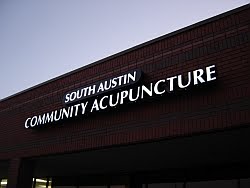The following is my response to a recent practice management article published in Acupuncture Today. I have emailed it to the editor, but given that Acupuncture Today is actually not the open forum they claim to be, I seriously doubt it will see the light of day. And so I am posting it here. This is the same publication that canned Lisa Rohleder of Working Class Acupuncture for her articles on community acupuncture and social entrepreneurism. Interestingly, Lisa was the only author in the history of the publication whose Acupuncture Today online talk back forum actually had any activity. Now the talk back forums are gone.
Here’s my letter:
In the spirit of Acupuncture Today being “committed to bringing an open forum to the acupuncture profession” I’d like to make some comments about Lawrence Howard’s article, “Many Offices, Many Lessons”. While some of Mr. Howard’s observations offer valid insights into human nature, some represent – to me – a mindset that as healthcare providers we have an ethical duty to transcend.
I congratulate Mr. Howard on his 13th anniversary of being a practitioner, but have to question the implications of working in more than 24 offices in 13 years. Is this accomplishment a result of the keen self awareness that ‘the likes of those he has worked for or with’ apparently lack? While bouncing around from clinic to clinic may offer a unique perspective, it is hardly a position from which to write about practice management with any authority.
I say this as someone who has been out of school about seven years and successfully owned and operated my own clinic for the last five years.
The notion that “through patient education, the practitioner encourages the patient to raise the dollar value they assign to their discomfort” is nothing short of absurd, and quite frankly morally reprehensible. Yes, Mr. Howard, some people have to “self discharge” because they can no longer afford treatment. Assigning greater value to ones discomfort unfortunately does not equate with greater means, or better outcomes.
And yes, sometimes fees do correlate with patient success. I see it all the time in my clinic, but based on my direct experience of 5 years and nearly 20,000 treatments given to date, it is not at all as you say it is.
How one structures their practice, whether insurance based or cash based, high cost or low cost, high volume or low volume, is a matter of personal preference. I have no issue with people charging whatever they want, however they want, for their services. But this idea that “high fees attract only the most committed patients and consequently have the highest chance of success, and thus referrals” is one that needs to be put to rest once and for all.
High fees attract only patients that can afford to pay high fees, and sure, if someone can afford high fees they can probably afford to get as much acupuncture as they want or need. But patients are committed to treatment for all kinds of reasons, and people stop coming for treatment for all kinds of reasons, and treatments succeed or fail for all kinds of reasons. To attempt to correlate high fees with greater commitment, or greater success is false logic, and from my perspective seems to be nothing more than the musings of someone who hasn’t been in one place long enough to know any better.
From what I can tell people have a higher chance of success if they can afford treatment. It’s that simple. Likewise, people refer if they see good results. It has nothing to do with how much they pay. I know this to be true because I charge $15 - $35, have committed patients, get great results, and have a vast network of referrals.
Your $300 quit smoking example is a good one. I think people basically are going to do what they do regardless of what they pay, but again their chances of success are improved by their ability to access the medicine. For example I have a social worker on a very limited fixed income coming to me for the NADA protocol currently, which we charge $10 for (that's right, I charge $10 for about 20 cents worth of needles and a couple of minutes of my time). She was distressed because with frequent treatment her budget was being stretched at that price. I offered her treatment for $5 instead, and she’s doing great. At the end of the day will she stop smoking and stay stopped. Who knows? But at least she now has the same chance as someone paying $300 has.
I’m not saying everyone should charge less, or practice how I practice, but this notion that people who can’t afford high priced treatment need merely to be educated or more committed needs to stop.
Perhaps acupuncturists would be well served by focusing on their commitment to their patients instead of their patients' commitment to them.




